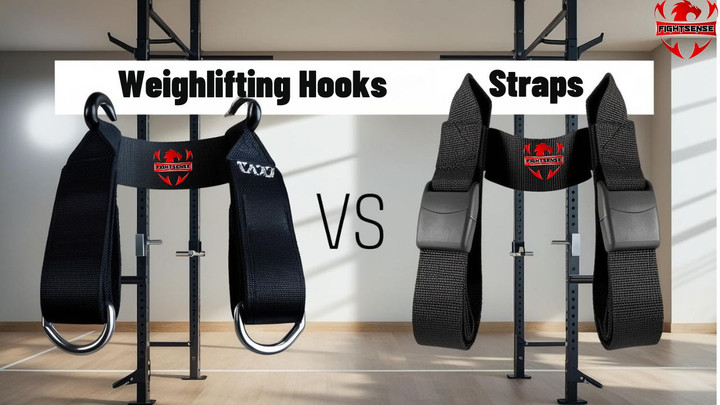Weight Lifting Hooks vs Straps: Why Hooks are Superior
14th Apr 2025
When lifting heavy, you have most likely wondered: which is better—weight lifting hooks vs straps? Although both devices help with weight lifting hooks have different benefits even if they enhance grip. With an eye toward their performance, comfort, and general advantages, this blog will investigate why weight lifting hooks are the better option for serious lifters.
Key Highlights:
- Weight lifting hooks improve grip and speed of setup.
- Unlike straps, they less strain and fatigue on the wrists.
- Ideal for deadlifts and rows among heavy lifts.
- Hooks for weight lifting improve your lifting general performance.
- They give lifters better support and durability.
What Are Weight Lifting Hooks?
Designed to latch onto the barbell, weight lifting hooks secure your hold and reduce wrist and hand pressure. Weight lifting hooks give a mechanical advantage unlike conventional straps that you must manually wrap around the bar. For lifters who require more assistance clinging to large weights during demanding exercises, they are perfect.
Why Weight Lifting Hooks vs Straps Which Are More Effective?
- Faster and Easier Setup
The setup time is one of the main benefits of weight lifting hooks vs straps. Conventional straps have you wrap them around the bar and change them with every set. The weight lifting hooks let you move fast between sets since they automatically lock on the bar. Especially in hard lifting sessions when time counts, this efficiency changes everything. - Superior Grip Support
Hooks provide a significantly more safe hold in the weight lifting hooks vs straps fight. The hooks latching straight on the bar eliminates the necessity for depending on wrapping and tension. This produces a more steady, safe grip that reduces the likelihood of slipping on heavier movements like deadlifts or rows. Using weight lifting hooks lets you concentrate on your form and muscle activation free from concern for losing control. - Reduces Wrist Strain
Regarding wrist discomfort, weight lifting hooks offer a clear benefit over straps. Hooks more fairly distribute the weight than straps that could strain your wrists. Particularly when lifting big weights for several repetitions, this lessens strain on your wrists and forearms. More effective training results from your being able to concentrate on your target muscles by means of the even distribution of weight.
The Best Exercises for Weight Lifting Hooks
Weight lifting hooks help several lifts especially those requiring a strong, safe hold tremendously. Weight lifting hooks are perfect for: here's why.
Deadlifts
One classic exercise where grip strength is usually the restricting element is deadlifts. By comparing weight lifting hooks vs straps, weight lifting hooks offer a mechanical advantage over straps. This lets you break through plateaus and raise heavier by concentrating just on your form and strength.
Pull-Ups and Rows
For pull-ups and rows, among other workouts, grip fatigue is a crucial limiting factor. Weight lifting hooks help you to have a strong grasp throughout your set, thereby avoiding grip failure and so affecting your performance. This helps you to more successfully activate your muscles, thereby enhancing the outcomes of your whole exercise.
Durability and Comfort of Weight Lifting Hooks
Regarding durability, weight lifting hooks usually shine over straps. Made of steel or aluminum, many premium weight lifting hooks guarantee their resistance against the demands of heavy lifting. Furthermore, often padded for comfort, the wristbands help to reduce irritation and discomfort after extended sessions.
For dedicated lifters, weight lifting hooks are an excellent investment since they combine comfort and durability.
Weight Lifting Hooks vs Straps: The Bottom Line
Weight lifting hooks vs straps, weight lifting hooks clearly outperform straps in terms of weight lifting technique. The go-to tool for heavy lifting is weight lifting hooks since they lessen wrist strain, offer faster setup and better grip support. Weight lifting hooks provide the extra security you need to increase your lifting performance and push past plateaus whether your training is deadlifts, rows, or pull-ups.
Conclusion
Weight lifting hooks vs straps, when it comes to improving your lifting performance, weight lifting hooks are the better option than straps. Compared to classic straps, they offer a faster setup, a solid grip, and less wrist strain. Should you be committed to lifting, it is advisable to switch to weight lifting hooks and observe how they let you to break through your limitations, increase train intensity, and raise greater weights.
Disclaimer:
Particularly if you have any current injuries, always speak with a fitness professional before adding new accessories or changing your exercise program.
FAQs:
What’s the advantage of weight lifting hooks vs straps?
Compared to conventional straps, weight lifting hooks offer a more safe grasp, quicker setup, and less wrist strain.
Can I use weight lifting hooks for all types of lifting?
For heavier exercises such deadlifts, rows, and pull-ups, where grip strength is a limiting consideration, weight lifting hooks are perfect.
Are weight lifting hooks comfortable to use?
Indeed, for more comfort during extended sessions, weight lifting hooks may feature padded wrist straps.
How do I use weight lifting hooks correctly?
You're good to go simply make sure the wrist straps are comfortably adjusted and the hooks are around the bar.
Can weight lifting hooks help me lift heavier weights?
Indeed, weight lifting hooks let you break through strength plateaus and increase efficiency by increasing your grip and lowering wrist strain.

